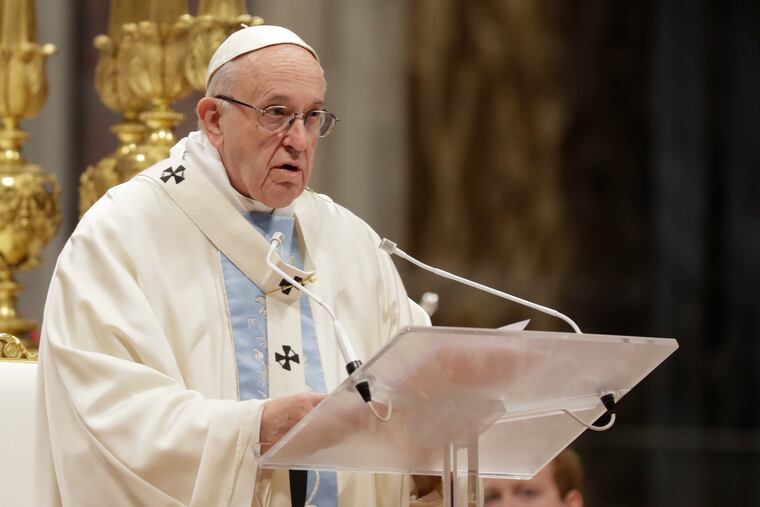Pope Francis tells U.S. bishops: Committees and ‘flow charts’ won’t solve sex-abuse crisis
In a letter addressed to more than 250 U.S. bishops gathered for a prayer retreat this week in Chicago, the pope offered no new proposals for clergy sex abuse reforms. But he appeared to obliquely respond to divisions that have split U.S. Catholic leaders after a year marked by scandals.

The Catholic hierarchy has been “lacking in unity and concentrated more on pointing fingers” in its response to the clergy sex-abuse crisis and needs more than “new committees and improving flow charts” to win back the trust of the faithful, Pope Francis asserted in a letter to U.S. bishops released Thursday.
The missive – addressed to more than 250 bishops gathered for a prayer retreat this week in Chicago – offered no concrete proposals for punishment or accountability measures.
But with its forceful language, Francis appeared to obliquely respond to divisions that have split U.S. Catholic leaders after a year marked by devastating scandals. The letter also set the stage for a high-stakes summit of bishops in Rome next month, where Francis has said he intends to define a global response to the crisis.
“Loss of credibility calls for a specific approach, since it cannot be regained by issuing stern decrees or by simply creating new committees or improving flow charts, as if we were in charge of a department of human resources,” he wrote. “Many of those things are necessary yet insufficient.”
>> READ MORE: Pope Francis' letter to U.S. bishops
Instead, he called for a “new approach to management, but also a change in our mindset, our way of praying, our handling of power and money, our exercise of authority and our way of relating to one another and the world.”
Copies of the eight-page letter, translated into English, were distributed to the nation’s bishops Wednesday night as they convened at a Chicago-area seminary for seven days of prayer and reflection – an unusual, closed-door gathering suggested by Francis himself. The letter was made public Thursday.
The pope wrote that he hoped the U.S. bishops would take the time to reflect upon a year that saw the resignation of top American Cardinal Theodore McCarrick for his own alleged sexual misconduct and damaging probes by state prosecutors in Pennsylvania and Illinois that uncovered hundreds of clergy sex-abuse allegations, decades of cover-up, and thousands of victims.
“The church’s mission continue[s] to suffer greatly as a result of abuses of power and conscience and sexual abuse, and the poor way that they were handled,” he wrote.
The scandals show no sign of abating this year with a federal investigation and probes in 12 states and the District of Columbia underway.
But while near unanimous consensus has emerged within the U.S. hierarchy that significant new accountability measures are needed, deep divisions remain over what steps should be taken.
A contingent of conservative Catholic leaders have blamed the sex-abuse crisis on homosexuals within their own ranks and have attempted to rally support to end what they see as a culture of permissiveness within the hierarchy. One – the former top Vatican diplomat in the U.S. – even called upon Pope Francis to resign, saying he was aware of McCarrick’s purported misdeeds.
Other prelates, however, have argued that the current problem stems from the bishops’ own failure to hold themselves to the same standards as the priests under their purview. They have proposed new ideas such as a zero-tolerance policy for abusive bishops and a civilian-led panel for investigating problem prelates.
The Vatican blocked a planned vote on those measures in November at the bishops’ biannual conference, raising concerns that they ran counter to church law and that canon lawyers in Rome had not been given enough time to review them.
But even if a vote had been taken, it was not clear from the U.S. prelates’ days of heated debate in Baltimore that any of the measures had garnered enough support to pass.
Francis responded to those divisions in his letter to the bishops this week, urging the prelates to “break the vicious cycle of recrimination, undercutting and discrediting by avoiding gossip and slander.”
He added: “As a church, we cannot be held hostage by this side or that, but must be attentive always to the start from those who are most vulnerable.”
In a brief response to the pope, Cardinal Daniel DiNardo, archbishop of Houston and president of the U.S. Conference of Catholic Bishops, asked Francis to pray for them and said the bishops “carry with us these days the pain and hope of all who may feel let down by the church.”
DiNardo will lead the U.S. delegation to the Vatican for the pope’s sex-abuse summit in Rome next month.